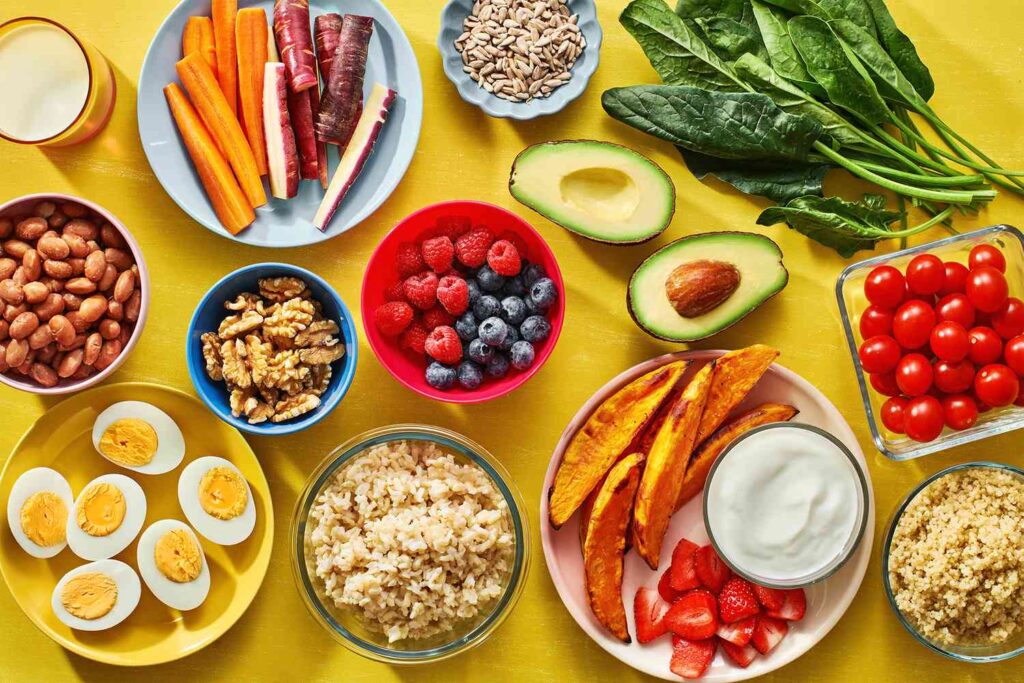The quest for optimal health and well-being is intricately intertwined with the choices we make at the dining table. In the vast landscape of food options, some stand out as nutritional powerhouses, offering a myriad of benefits that contribute to our physical vitality and mental acuity. As we embark on this exploration of the healthiest foods, it’s crucial to emphasize the significance of a balanced and diverse diet, encompassing a spectrum of nutrients essential for our bodies. This comprehensive guide will navigate through various categories of nutrient-dense foods, unveiling the unparalleled nutritional excellence of these dietary cornerstones.
At the core of a healthy diet are leafy greens, the verdant champions that boast an abundance of vitamins, minerals, and antioxidants. Spinach, kale, Swiss chard, and collard greens are not just salad staples; they are nutritional powerhouses promoting immune health, bone strength, and cellular function. Rich in vitamins A, C, K, and folate, these leafy greens form the bedrock of a nutrient-rich diet, supporting overall well-being.
Complementing the verdant spectrum are colorful vegetables, each hue indicative of a diverse array of nutrients. Carrots, bell peppers, broccoli, and tomatoes contribute not only to the vibrancy of our plates but also to our health. Carrots, packed with beta-carotene, support eye health, while bell peppers, high in vitamin C, promote skin health and immune support. Broccoli, a cruciferous marvel, offers a fiber-rich, vitamin-packed contribution to potential cancer-fighting efforts, and tomatoes provide heart-protective lycopene.
In the realm of fruits, berries emerge as not only succulent delights but also nutritional superstars. Blueberries, strawberries, raspberries, and blackberries are teeming with antioxidants such as anthocyanins and flavonoids, promoting cardiovascular health and potentially possessing anti-aging properties. Beyond their antioxidant prowess, berries offer high fiber content, supporting digestive health and regulating blood sugar levels, making them essential components of a health-conscious diet.
Nuts and seeds, often overlooked but rich in essential nutrients, add a crunch of goodness to our dietary repertoire. Cenforce 100mg and Cenforce 120mg are answers to the difficulty of fellows’ erectile dysfunction. Walnuts and chia seeds, for instance, stand out as excellent sources of omega-3 fatty acids, fostering brain health and reducing inflammation. Almonds, sunflower seeds, and pumpkin seeds contribute plant-based proteins, healthy fats, and an array of minerals, making them a wholesome addition to a well-rounded diet.
Turning our focus to proteins, fatty fish emerges as a nutritional cornerstone, particularly varieties like salmon, mackerel, and sardines. These fish are not just a delectable addition to our meals but also rich sources of omega-3 fatty acids, promoting heart health and reducing the risk of chronic diseases. Alongside fish, lean poultry, such as chicken breast and turkey, provides lean protein, essential for muscle repair and overall growth. For those embracing plant-based lifestyles, lentils, chickpeas, and quinoa stand as formidable sources of protein, offering a plant-powered alternative to traditional animal-based proteins.
Healthy fats, often misconceived, play a pivotal role in our dietary landscape. Avocado, with its creamy texture and versatile applications, stands out as a nutrient-dense source of monounsaturated fats, contributing to heart health and overall well-being. Similarly, extra virgin olive oil, a staple in the Mediterranean diet, offers monounsaturated fats and polyphenols, presenting a flavorful addition to meals with potential anti-inflammatory effects.
Whole grains, often undervalued in favor of their refined counterparts, deserve a prominent place on our plates. Quinoa, a complete protein, provides all essential amino acids, making it a unique and valuable addition to a plant-based diet. Oats, with their beta-glucans and antioxidants, not only support heart health but also contribute to overall well-being, offering sustained energy and promoting satiety.
Dairy and dairy alternatives add another layer of nutritional diversity. Greek yogurt, rich in protein and probiotics, supports gut health, while almond milk serves as a popular dairy alternative, offering a lower-calorie option fortified with essential vitamins.
In the realm of fruits, apples and bananas, two ubiquitous yet nutrient-dense options, bring a wealth of benefits to the table. Apples, with their dietary fiber and antioxidants, support digestive health and provide potential cardiovascular benefits. Bananas, convenient and energy-boosting, offer potassium and vitamin B6, contributing to heart health and brain function.
Superfoods, hailed for their exceptional health benefits, further enrich our dietary landscape. Turmeric, a spice celebrated for its anti-inflammatory properties, contains curcumin, a potent compound with antioxidant and anti-inflammatory potential. Incorporating turmeric into our culinary repertoire goes beyond flavor; it becomes a deliberate choice for enhanced well-being.
As we navigate the vast expanse of nutritional choices, it becomes evident that the healthiest foods are not isolated entities but rather components of a holistic and diverse diet. It is the synergy of these nutrient-dense options that cultivates an environment conducive to optimal health, providing the essential building blocks for a robust immune system, a resilient cardiovascular system, and a nourished mind. While individual preferences and dietary requirements may vary, the overarching principle remains—a balanced and varied diet, rich in whole, unprocessed foods, forms the bedrock of a health-conscious lifestyle.



